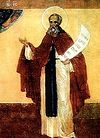

| Previous day | Next day |
| Old Style
February 13
|
Friday |
New Style
February 26
|
| Fast-free Week. Tone 4. | No fast.
|
![]() St. Martinian, monk, of Caesarea in Palestine (5th c.), Archbishop Seraphim (Sobolev) of Bogucharsk, Bulgaria (1950).
St. Martinian, monk, of Caesarea in Palestine (5th c.), Archbishop Seraphim (Sobolev) of Bogucharsk, Bulgaria (1950).
and Sts. Zoe of Bethlehem and the virgin Photina (5th c.). St. Eulogius, patriarch of Alexandria (607-608). St. Symeon the Myrrh-gusher, prince of Serbia (1200). Synaxis of the Saints of Omsk. St. Joseph, founder of Volokolamsk (Volotsk) Monastery (1515).
New Hieromartyrs Leontius Grimalsky, archpriest, of Gzhel (Moscow) and Zosima Trubachev, archpriest, of Maloyaroslavets (1938).
Apostle Aquila of the Seventy, and St. Priscilla (1st c.) St. Timothy, archbishop of Alexandria (385). St. Castor of Karden, hieromonk and missionary (Germany) (ca. 400). St. Modomnoc, bishop of Ossory (Ireland) (6th c.).
Repose of Abbess Seraphima of Sezenovo (1877).
Thoughts for Each Day of the Year
According to the Daily Church Readings from the Word of God
By St. Theophan the Recluse

Friday. [I John 2:7–17; Mark 14:3–9]
The world passeth away, and the lust thereof (I John 2:17). Who does not see this? Everything around us passes away—things, people, events; and we ourselves are passing away. Worldly lust also passes; we scarcely taste the sweetness of its satisfaction before both the lust and the sweetness disappear. We chase after something else, and it is the same; we chase after a third thing—again the same. Nothing stands still; everything comes and goes. What? Is there really nothing constant?! There is, says the Apostle: he that doeth the will of God abideth for ever (I John 2:17). How does the world, which is so transient, endure? Because God so desires that the world endure. The will of God is the world’s unshakeable and indestructible foundation. It is the same among people—whosoever begins to stand firmly in the will of God is made steadfast and firm at once. One’s thoughts are restless when chasing after something transient. But as soon as one comes to his senses and returns to the path of the will of God, his thoughts and intentions begin to settle down. When at last one succeeds in acquiring the habit for such a way of life, everything he has, both within and without, comes into quiet harmony and serene order. Having begun here, this deep peace and imperturbable serenity will pass over to the other life as well, and there it will abide unto the ages. Amidst the general transience of things around us, this is what is not transient, and what is constant within us: walking in the will of God.
Articles
 Venerable Martinian of Caesarea, in PalestineSaint Martinian went to live in the wilderness at the age of eighteen, not far from the city of Caesarea in Palestine. |
 St. ZoeSaint Zoe remained on the island, where she spent six years in solitude, and then she gave up her soul to God. |
 St. PhotinaSaint Photina remained on the island, where she spent six years in solitude, and then she gave up her soul to God. |
 St. Eulogius the Archbishop of AlexandriaSaint Eulogius, Patriarch of Alexandria, was one of the enlightened hierarchs of the sixth century. |






